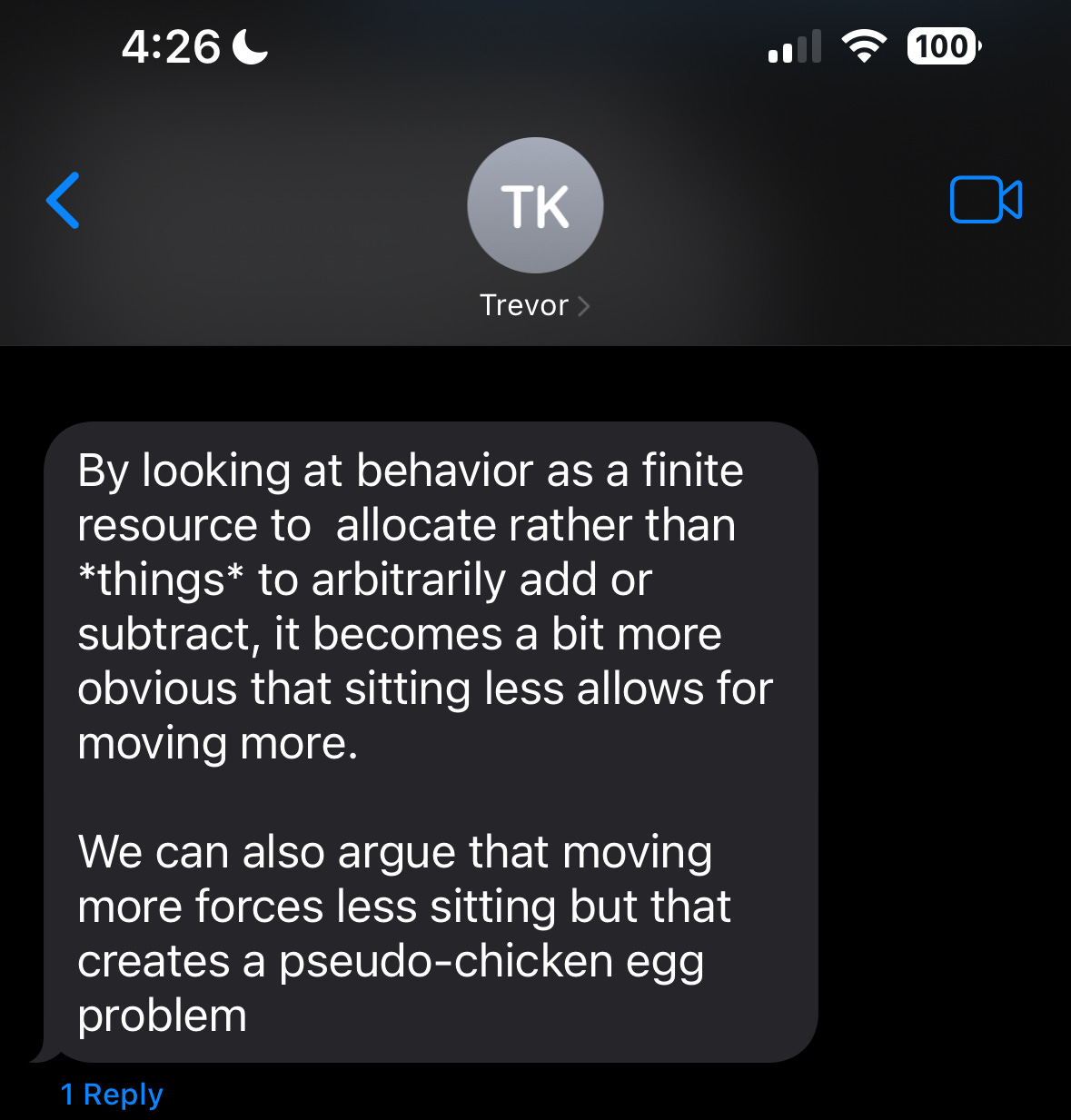The 15 best comments on Two Percent and my responses
Your questions: Answered. (Plus a lot of wisdom from all of you!)
Post Summary
We’re featuring responses to the top 15 comments on Two Percent posts over the last three months.
Magic happens in the comments, where additional information, insight, and inspiration comes to light. It can help us all live better, think differently, and more.
I’ll highlight some of the best comments and questions and given extra information you can use to live better.
We’ll cover:
Why asking better questions can improve your health and fitness.
Why weight language sucks.
A case study on the benefits of being SUPERMEDIUM.
A problem with lab-based and at-home VO2 testing.
A food to eat that may decrease microplastics in your body.
A walking prescription.
My wife the insane walker’s favorite walking gear.
Ozempic debate and noise.
The case for joining a wellness cult.
Exactly how aging people should strength train.
A sign to look for that shows you have a good doctor.
How to pull of rucking/walking video meetings.
A better way to frame and change bad habits.
The nutritional differences between conventional and organic eggs.
Wise words about the realities of parenting.
Housekeeping
Full access to this post is for Members of Two Percent.
Become a Member. You’ll get all Two Percent posts, their podcasts, and access to our wisdom-filled comments section.
Thanks to our partners:
GOREWEAR: Maker of cutting-edge, science-backed endurance apparel that performs no matter what nature throws at you. Their gear has the official “Have Fun, Don’t Die” seal of approval. Check out the Concurve Jacket.
Use code EASTER or EASTER30 for 30% off.
Audio/podcast version
The post
I love our comments section. It’s the heart of Two Percent—the place where we exchange ideas, ask questions, and offer advice. We have a wonderful group of humans making each other better here.
So we’re rounding up some of the best comments and questions on Two Percent posts from the last quarter.
I’ll feature the comment and drop in my own commentary, answer, thoughts, pushback, agreement, whatever.
There isn’t a singular theme to these comments.
Some are inspiring.
Some are informative.
Some ask a wise question that I answer.
Two Notes:
I’ve lightly edited and shortened some of these comments for brevity.
This post is long. Skim it and look for topics that interest you. Then dive in.
Top Two Percent comments: Sept-Dec 2024
1. To increase your activity, ask the right questions
From: Why modern jobs hurt our health in new and insidious ways
Commenter: Kim Breimeier
The comment:
One thing I've noticed since I grew up is our homes. We had a decently nice house. But the function of our home was to support us when we weren't doing other stuff. We ate there, we had family gatherings there, and we slept there. But mostly that was it. If we weren't doing one of those things, we were not home. On weekends our family was busy hunting, trapping, camping, walking in rivers looking for rocks. We didn't LIVE at home. We lived in the world and home supported our needs for food and comfortable rest. Over the past 25 years there seems to be a big shift to homes being where we live, and the outside world being something we visit for a few minutes a day. Our homes are bigger, they are extra comfortable, we often work in them (both my husband and I WFH permanently), our entertainment is streaming.
Michael’s thoughts
The wise Dr. Trevor Kashey once mentioned something fascinating. He told me:
Instead of asking, ‘How can I be more active?,’ ask ‘Why do I sit so much in the first place?’
I followed up with a text, and Trevor explained:
Now we’re getting somewhere.
I agree with Kim that people spend more time in the home today—a long trend that was amplified by the pandemic.
Being in the home increases the probability that you’ll sit. It offers sofas and stools and recliners and beds galore.
Being out of the home, especially outside, reduces the odds that you’ll sit.
So if you want to move more, try going somewhere you’re less likely to sit.
2. Weight language sucks
From: The BMI Deep Dive
Commenter: Kevin Bowman
The comment:
I think one reason why there’s so much pushback on BMI is that “overweight” and “obese” are socially loaded words. Especially for the health conscious, these terms denote failure.
Michael’s thoughts
The government and researchers use the terms “normal” to describe BMIs between 18 and 25. They use “overweight” and “obese” for BMIs over 25.
And I hate it! I agree those words have become socially loaded, denoting failure.
I’m currently working on a project for Audible where I had to use those words in a script. I wrote into the script that I disliked the words but used them because they’re the standard language.
The standard language needs some updating.
And so, an ask: If you have suggestions, drop them in the comments.
3. A case study on the benefits of being SUPERMEDIUM.
From: How much muscle do you really need for health?
Commenter: Gerald
The comment:
As a former competitive endurance athlete I decided at age 50 to go all in on building muscle. I put on 20 to 25 pounds while trying to maintain about 15 percent body fat. At age 60, the 20 pounds became a hinderance to my health. My blood pressure and lipids increased. I had less mobility and was more stiff.
I have since decreased my weight by 15 pounds and added more endurance exercise and less weight training (no more than 3 days a week compared to 6 days a week). All of my health markers have returned to their previous status.
Michael’s thoughts
I hear versions of this story often and have experienced it myself. It’s mostly a phenomenon among men.
It can be fun to weight train and eat more to gain as much muscle as possible. But it does come with downsides. Health markers often change, mobility goes down, your endurance sucks, and so on.
With all things fitness, I go back to the concept of “enough.”
A person who does all types of exercise—strength, endurance, mobility—usually lands on a body type that feels good and looks good in lab numbers. They have “enough” of each skill to be well-rounded and healthy. Be SUPERMEDIUM.
4. VO2 testing problems
From: AMA: Plant vs. Animal Protein, Caffeine and Exercise, More VO2 Tests
Commenter: Michael B.
The comment (for context, the post gave at-home ways to measure your VO2):
Regarding different at-home tests to estimate VO2 instead of a lab test with the mask, don’t all of them have some “skill” component similar to what you said about swimming? For example, two people can have the same lab measured VO2 max but one of them could be an elite runner and the other could have bad form. The one with better running economy will go much further in the at-home VO2 running test you wrote about. So how accurate are these at-home tests vs gold standard in a lab?
Michael’s thoughts
Skill absolutely factors into any at-home VO2 test. E.g., a person who swims well will score better on an at-home swimming VO2 test compared to someone who sucks at swimming.
Surprisingly, skill also factors into and changes your lab-based test results. No test is perfect—but there are some solutions.
To get more info on the topic, I texted one of us who knows the most: Brady Holmer.
Brady writes Physiologically Speaking and is the author of VO2 Max Essentials.





